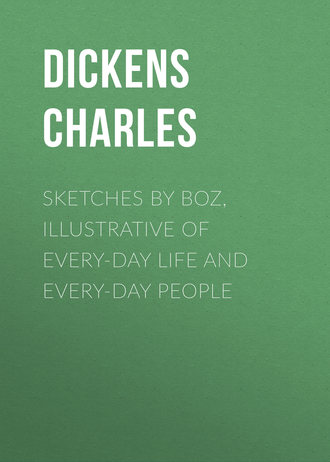
Чарльз Диккенс
Sketches by Boz, Illustrative of Every-Day Life and Every-Day People
The next morning, John Dounce was rather feverish with the extra brandy-and-water of the previous night; and, partly in the hope of cooling himself with an oyster, and partly with the view of ascertaining whether he owed the young lady anything, or not, went back to the oyster-shop. If the young lady had appeared beautiful by night, she was perfectly irresistible by day; and, from this time forward, a change came over the spirit of John Dounce’s dream. He bought shirt-pins; wore a ring on his third finger; read poetry; bribed a cheap miniature-painter to perpetrate a faint resemblance to a youthful face, with a curtain over his head, six large books in the background, and an open country in the distance (this he called his portrait); ‘went on’ altogether in such an uproarious manner, that the three Miss Dounces went off on small pensions, he having made the tenement in Cursitor-street too warm to contain them; and in short, comported and demeaned himself in every respect like an unmitigated old Saracen, as he was.
As to his ancient friends, the other old boys, at the Sir Somebody’s Head, he dropped off from them by gradual degrees; for, even when he did go there, Jones – vulgar fellow that Jones – persisted in asking ‘when it was to be?’ and ‘whether he was to have any gloves?’ together with other inquiries of an equally offensive nature: at which not only Harris laughed, but Jennings also; so, he cut the two, altogether, and attached himself solely to the blue young lady at the smart oyster-shop.
Now comes the moral of the story – for it has a moral after all. The last-mentioned young lady, having derived sufficient profit and emolument from John Dounce’s attachment, not only refused, when matters came to a crisis, to take him for better for worse, but expressly declared, to use her own forcible words, that she ‘wouldn’t have him at no price;’ and John Dounce, having lost his old friends, alienated his relations, and rendered himself ridiculous to everybody, made offers successively to a schoolmistress, a landlady, a feminine tobacconist, and a housekeeper; and, being directly rejected by each and every of them, was accepted by his cook, with whom he now lives, a henpecked husband, a melancholy monument of antiquated misery, and a living warning to all uxorious old boys.
CHAPTER VIII – THE MISTAKEN MILLINER. A TALE OF AMBITION
Miss Amelia Martin was pale, tallish, thin, and two-and-thirty – what ill-natured people would call plain, and police reports interesting. She was a milliner and dressmaker, living on her business and not above it. If you had been a young lady in service, and had wanted Miss Martin, as a great many young ladies in service did, you would just have stepped up, in the evening, to number forty-seven, Drummond-street, George-street, Euston-square, and after casting your eye on a brass door-plate, one foot ten by one and a half, ornamented with a great brass knob at each of the four corners, and bearing the inscription ‘Miss Martin; millinery and dressmaking, in all its branches;’ you’d just have knocked two loud knocks at the street-door; and down would have come Miss Martin herself, in a merino gown of the newest fashion, black velvet bracelets on the genteelest principle, and other little elegancies of the most approved description.
If Miss Martin knew the young lady who called, or if the young lady who called had been recommended by any other young lady whom Miss Martin knew, Miss Martin would forthwith show her up-stairs into the two-pair front, and chat she would —so kind, and so comfortable – it really wasn’t like a matter of business, she was so friendly; and, then Miss Martin, after contemplating the figure and general appearance of the young lady in service with great apparent admiration, would say how well she would look, to be sure, in a low dress with short sleeves; made very full in the skirts, with four tucks in the bottom; to which the young lady in service would reply in terms expressive of her entire concurrence in the notion, and of the virtuous indignation with which she reflected on the tyranny of ‘Missis,’ who wouldn’t allow a young girl to wear a short sleeve of an arternoon – no, nor nothing smart, not even a pair of ear-rings; let alone hiding people’s heads of hair under them frightful caps. At the termination of this complaint, Miss Amelia Martin would distantly suggest certain dark suspicions that some people were jealous on account of their own daughters, and were obliged to keep their servants’ charms under, for fear they should get married first, which was no uncommon circumstance – leastways she had known two or three young ladies in service, who had married a great deal better than their missises, and they were not very good-looking either; and then the young lady would inform Miss Martin, in confidence, that how one of their young ladies was engaged to a young man and was a-going to be married, and Missis was so proud about it there was no bearing of her; but how she needn’t hold her head quite so high neither, for, after all, he was only a clerk. And, after expressing due contempt for clerks in general, and the engaged clerk in particular, and the highest opinion possible of themselves and each other, Miss Martin and the young lady in service would bid each other good night, in a friendly but perfectly genteel manner: and the one went back to her ‘place,’ and the other, to her room on the second-floor front.
There is no saying how long Miss Amelia Martin might have continued this course of life; how extensive a connection she might have established among young ladies in service; or what amount her demands upon their quarterly receipts might have ultimately attained, had not an unforeseen train of circumstances directed her thoughts to a sphere of action very different from dressmaking or millinery.
A friend of Miss Martin’s who had long been keeping company with an ornamental painter and decorator’s journeyman, at last consented (on being at last asked to do so) to name the day which would make the aforesaid journeyman a happy husband. It was a Monday that was appointed for the celebration of the nuptials, and Miss Amelia Martin was invited, among others, to honour the wedding-dinner with her presence. It was a charming party; Somers-town the locality, and a front parlour the apartment. The ornamental painter and decorator’s journeyman had taken a house – no lodgings nor vulgarity of that kind, but a house – four beautiful rooms, and a delightful little washhouse at the end of the passage – which was the most convenient thing in the world, for the bridesmaids could sit in the front parlour and receive the company, and then run into the little washhouse and see how the pudding and boiled pork were getting on in the copper, and then pop back into the parlour again, as snug and comfortable as possible. And such a parlour as it was! Beautiful Kidderminster carpet – six bran-new cane-bottomed stained chairs – three wine-glasses and a tumbler on each sideboard – farmer’s girl and farmer’s boy on the mantelpiece: girl tumbling over a stile, and boy spitting himself, on the handle of a pitchfork – long white dimity curtains in the window – and, in short, everything on the most genteel scale imaginable.
Then, the dinner. There was baked leg of mutton at the top, boiled leg of mutton at the bottom, pair of fowls and leg of pork in the middle; porter-pots at the corners; pepper, mustard, and vinegar in the centre; vegetables on the floor; and plum-pudding and apple-pie and tartlets without number: to say nothing of cheese, and celery, and water-cresses, and all that sort of thing. As to the Company! Miss Amelia Martin herself declared, on a subsequent occasion, that, much as she had heard of the ornamental painter’s journeyman’s connexion, she never could have supposed it was half so genteel. There was his father, such a funny old gentleman – and his mother, such a dear old lady – and his sister, such a charming girl – and his brother, such a manly-looking young man – with such a eye! But even all these were as nothing when compared with his musical friends, Mr. and Mrs. Jennings Rodolph, from White Conduit, with whom the ornamental painter’s journeyman had been fortunate enough to contract an intimacy while engaged in decorating the concert-room of that noble institution. To hear them sing separately, was divine, but when they went through the tragic duet of ‘Red Ruffian, retire!’ it was, as Miss Martin afterwards remarked, ‘thrilling.’ And why (as Mr. Jennings Rodolph observed) why were they not engaged at one of the patent theatres? If he was to be told that their voices were not powerful enough to fill the House, his only reply was, that he would back himself for any amount to fill Russell-square – a statement in which the company, after hearing the duet, expressed their full belief; so they all said it was shameful treatment; and both Mr. and Mrs. Jennings Rodolph said it was shameful too; and Mr. Jennings Rodolph looked very serious, and said he knew who his malignant opponents were, but they had better take care how far they went, for if they irritated him too much he had not quite made up his mind whether he wouldn’t bring the subject before Parliament; and they all agreed that it ‘’ud serve ’em quite right, and it was very proper that such people should be made an example of.’ So Mr. Jennings Rodolph said he’d think of it.
When the conversation resumed its former tone, Mr. Jennings Rodolph claimed his right to call upon a lady, and the right being conceded, trusted Miss Martin would favour the company – a proposal which met with unanimous approbation, whereupon Miss Martin, after sundry hesitatings and coughings, with a preparatory choke or two, and an introductory declaration that she was frightened to death to attempt it before such great judges of the art, commenced a species of treble chirruping containing frequent allusions to some young gentleman of the name of Hen-e-ry, with an occasional reference to madness and broken hearts. Mr. Jennings Rodolph frequently interrupted the progress of the song, by ejaculating ‘Beautiful!’ – ‘Charming!’ – ‘Brilliant!’ – ‘Oh! splendid,’ &c.; and at its close the admiration of himself, and his lady, knew no bounds.
‘Did you ever hear so sweet a voice, my dear?’ inquired Mr. Jennings Rodolph of Mrs. Jennings Rodolph.
‘Never; indeed I never did, love,’ replied Mrs. Jennings Rodolph.
‘Don’t you think Miss Martin, with a little cultivation, would be very like Signora Marra Boni, my dear?’ asked Mr. Jennings Rodolph.
‘Just exactly the very thing that struck me, my love,’ answered Mrs. Jennings Rodolph.
And thus the time passed away; Mr. Jennings Rodolph played tunes on a walking-stick, and then went behind the parlour-door and gave his celebrated imitations of actors, edge-tools, and animals; Miss Martin sang several other songs with increased admiration every time; and even the funny old gentleman began singing. His song had properly seven verses, but as he couldn’t recollect more than the first one, he sang that over seven times, apparently very much to his own personal gratification. And then all the company sang the national anthem with national independence – each for himself, without reference to the other – and finally separated: all declaring that they never had spent so pleasant an evening: and Miss Martin inwardly resolving to adopt the advice of Mr. Jennings Rodolph, and to ‘come out’ without delay.
Now, ‘coming out,’ either in acting, or singing, or society, or facetiousness, or anything else, is all very well, and remarkably pleasant to the individual principally concerned, if he or she can but manage to come out with a burst, and being out, to keep out, and not go in again; but, it does unfortunately happen that both consummations are extremely difficult to accomplish, and that the difficulties, of getting out at all in the first instance, and if you surmount them, of keeping out in the second, are pretty much on a par, and no slight ones either – and so Miss Amelia Martin shortly discovered. It is a singular fact (there being ladies in the case) that Miss Amelia Martin’s principal foible was vanity, and the leading characteristic of Mrs. Jennings Rodolph an attachment to dress. Dismal wailings were heard to issue from the second-floor front of number forty-seven, Drummond-street, George-street, Euston-square; it was Miss Martin practising. Half-suppressed murmurs disturbed the calm dignity of the White Conduit orchestra at the commencement of the season. It was the appearance of Mrs. Jennings Rodolph in full dress, that occasioned them. Miss Martin studied incessantly – the practising was the consequence. Mrs. Jennings Rodolph taught gratuitously now and then – the dresses were the result.
Weeks passed away; the White Conduit season had begun, and progressed, and was more than half over. The dressmaking business had fallen off, from neglect; and its profits had dwindled away almost imperceptibly. A benefit-night approached; Mr. Jennings Rodolph yielded to the earnest solicitations of Miss Amelia Martin, and introduced her personally to the ‘comic gentleman’ whose benefit it was. The comic gentleman was all smiles and blandness – he had composed a duet, expressly for the occasion, and Miss Martin should sing it with him. The night arrived; there was an immense room – ninety-seven sixpenn’orths of gin-and-water, thirty-two small glasses of brandy-and-water, five-and-twenty bottled ales, and forty-one neguses; and the ornamental painter’s journeyman, with his wife and a select circle of acquaintance, were seated at one of the side-tables near the orchestra. The concert began. Song – sentimental – by a light-haired young gentleman in a blue coat, and bright basket buttons – [applause]. Another song, doubtful, by another gentleman in another blue coat and more bright basket buttons – [increased applause]. Duet, Mr. Jennings Rodolph, and Mrs. Jennings Rodolph, ‘Red Ruffian, retire!’ – [great applause]. Solo, Miss Julia Montague (positively on this occasion only) – ‘I am a Friar’ – [enthusiasm]. Original duet, comic – Mr. H. Taplin (the comic gentleman) and Miss Martin – ‘The Time of Day.’ ‘Brayvo! – Brayvo!’ cried the ornamental painter’s journeyman’s party, as Miss Martin was gracefully led in by the comic gentleman. ‘Go to work, Harry,’ cried the comic gentleman’s personal friends. ‘Tap-tap-tap,’ went the leader’s bow on the music-desk. The symphony began, and was soon afterwards followed by a faint kind of ventriloquial chirping, proceeding apparently from the deepest recesses of the interior of Miss Amelia Martin. ‘Sing out’ – shouted one gentleman in a white great-coat. ‘Don’t be afraid to put the steam on, old gal,’ exclaimed another, ‘S-s-s-s-s-s-s’-went the five-and-twenty bottled ales. ‘Shame, shame!’ remonstrated the ornamental painter’s journeyman’s party – ‘S-s-s-s’ went the bottled ales again, accompanied by all the gins, and a majority of the brandies.
‘Turn them geese out,’ cried the ornamental painter’s journeyman’s party, with great indignation.
‘Sing out,’ whispered Mr. Jennings Rodolph.
‘So I do,’ responded Miss Amelia Martin.
‘Sing louder,’ said Mrs. Jennings Rodolph.
‘I can’t,’ replied Miss Amelia Martin.
‘Off, off, off,’ cried the rest of the audience.
‘Bray-vo!’ shouted the painter’s party. It wouldn’t do – Miss Amelia Martin left the orchestra, with much less ceremony than she had entered it; and, as she couldn’t sing out, never came out. The general good humour was not restored until Mr. Jennings Rodolph had become purple in the face, by imitating divers quadrupeds for half an hour, without being able to render himself audible; and, to this day, neither has Miss Amelia Martin’s good humour been restored, nor the dresses made for and presented to Mrs. Jennings Rodolph, nor the local abilities which Mr. Jennings Rodolph once staked his professional reputation that Miss Martin possessed.
CHAPTER IX – THE DANCING ACADEMY
Of all the dancing academies that ever were established, there never was one more popular in its immediate vicinity than Signor Billsmethi’s, of the ‘King’s Theatre.’ It was not in Spring-gardens, or Newman-street, or Berners-street, or Gower-street, or Charlotte-street, or Percy-street, or any other of the numerous streets which have been devoted time out of mind to professional people, dispensaries, and boarding-houses; it was not in the West-end at all – it rather approximated to the eastern portion of London, being situated in the populous and improving neighbourhood of Gray’s-inn-lane. It was not a dear dancing academy – four-and-sixpence a quarter is decidedly cheap upon the whole. It was very select, the number of pupils being strictly limited to seventy-five, and a quarter’s payment in advance being rigidly exacted. There was public tuition and private tuition – an assembly-room and a parlour. Signor Billsmethi’s family were always thrown in with the parlour, and included in parlour price; that is to say, a private pupil had Signor Billsmethi’s parlour to dance in, and Signor Billsmethi’s family to dance with; and when he had been sufficiently broken in in the parlour, he began to run in couples in the assembly-room.
Such was the dancing academy of Signor Billsmethi, when Mr. Augustus Cooper, of Fetter-lane, first saw an unstamped advertisement walking leisurely down Holborn-hill, announcing to the world that Signor Billsmethi, of the King’s Theatre, intended opening for the season with a Grand Ball.
Now, Mr. Augustus Cooper was in the oil and colour line – just of age, with a little money, a little business, and a little mother, who, having managed her husband and his business in his lifetime, took to managing her son and his business after his decease; and so, somehow or other, he had been cooped up in the little back parlour behind the shop on week-days, and in a little deal box without a lid (called by courtesy a pew) at Bethel Chapel, on Sundays, and had seen no more of the world than if he had been an infant all his days; whereas Young White, at the gas-fitter’s over the way, three years younger than him, had been flaring away like winkin’ – going to the theatre – supping at harmonic meetings – eating oysters by the barrel – drinking stout by the gallon – even out all night, and coming home as cool in the morning as if nothing had happened. So Mr. Augustus Cooper made up his mind that he would not stand it any longer, and had that very morning expressed to his mother a firm determination to be ‘blowed,’ in the event of his not being instantly provided with a street-door key. And he was walking down Holborn-hill, thinking about all these things, and wondering how he could manage to get introduced into genteel society for the first time, when his eyes rested on Signor Billsmethi’s announcement, which it immediately struck him was just the very thing he wanted; for he should not only be able to select a genteel circle of acquaintance at once, out of the five-and-seventy pupils at four-and-sixpence a quarter, but should qualify himself at the same time to go through a hornpipe in private society, with perfect ease to himself and great delight to his friends. So, he stopped the unstamped advertisement – an animated sandwich, composed of a boy between two boards – and having procured a very small card with the Signor’s address indented thereon, walked straight at once to the Signor’s house – and very fast he walked too, for fear the list should be filled up, and the five-and-seventy completed, before he got there. The Signor was at home, and, what was still more gratifying, he was an Englishman! Such a nice man – and so polite! The list was not full, but it was a most extraordinary circumstance that there was only just one vacancy, and even that one would have been filled up, that very morning, only Signor Billsmethi was dissatisfied with the reference, and, being very much afraid that the lady wasn’t select, wouldn’t take her.
‘And very much delighted I am, Mr. Cooper,’ said Signor Billsmethi, ‘that I did not take her. I assure you, Mr. Cooper – I don’t say it to flatter you, for I know you’re above it – that I consider myself extremely fortunate in having a gentleman of your manners and appearance, sir.’
‘I am very glad of it too, sir,’ said Augustus Cooper.
‘And I hope we shall be better acquainted, sir,’ said Signor Billsmethi.
‘And I’m sure I hope we shall too, sir,’ responded Augustus Cooper. Just then, the door opened, and in came a young lady, with her hair curled in a crop all over her head, and her shoes tied in sandals all over her ankles.
‘Don’t run away, my dear,’ said Signor Billsmethi; for the young lady didn’t know Mr. Cooper was there when she ran in, and was going to run out again in her modesty, all in confusion-like. ‘Don’t run away, my dear,’ said Signor Billsmethi, ‘this is Mr. Cooper – Mr. Cooper, of Fetter-lane. Mr. Cooper, my daughter, sir – Miss Billsmethi, sir, who I hope will have the pleasure of dancing many a quadrille, minuet, gavotte, country-dance, fandango, double-hornpipe, and farinagholkajingo with you, sir. She dances them all, sir; and so shall you, sir, before you’re a quarter older, sir.’
And Signor Bellsmethi slapped Mr. Augustus Cooper on the back, as if he had known him a dozen years, – so friendly; – and Mr. Cooper bowed to the young lady, and the young lady curtseyed to him, and Signor Billsmethi said they were as handsome a pair as ever he’d wish to see; upon which the young lady exclaimed, ‘Lor, pa!’ and blushed as red as Mr. Cooper himself – you might have thought they were both standing under a red lamp at a chemist’s shop; and before Mr. Cooper went away it was settled that he should join the family circle that very night – taking them just as they were – no ceremony nor nonsense of that kind – and learn his positions in order that he might lose no time, and be able to come out at the forthcoming ball.
Well; Mr. Augustus Cooper went away to one of the cheap shoemakers’ shops in Holborn, where gentlemen’s dress-pumps are seven-and-sixpence, and men’s strong walking just nothing at all, and bought a pair of the regular seven-and-sixpenny, long-quartered, town-mades, in which he astonished himself quite as much as his mother, and sallied forth to Signor Billsmethi’s. There were four other private pupils in the parlour: two ladies and two gentlemen. Such nice people! Not a bit of pride about them. One of the ladies in particular, who was in training for a Columbine, was remarkably affable; and she and Miss Billsmethi took such an interest in Mr. Augustus Cooper, and joked, and smiled, and looked so bewitching, that he got quite at home, and learnt his steps in no time. After the practising was over, Signor Billsmethi, and Miss Billsmethi, and Master Billsmethi, and a young lady, and the two ladies, and the two gentlemen, danced a quadrille – none of your slipping and sliding about, but regular warm work, flying into corners, and diving among chairs, and shooting out at the door, – something like dancing! Signor Billsmethi in particular, notwithstanding his having a little fiddle to play all the time, was out on the landing every figure, and Master Billsmethi, when everybody else was breathless, danced a hornpipe, with a cane in his hand, and a cheese-plate on his head, to the unqualified admiration of the whole company. Then, Signor Billsmethi insisted, as they were so happy, that they should all stay to supper, and proposed sending Master Billsmethi for the beer and spirits, whereupon the two gentlemen swore, ‘strike ’em wulgar if they’d stand that;’ and were just going to quarrel who should pay for it, when Mr. Augustus Cooper said he would, if they’d have the kindness to allow him – and they had the kindness to allow him; and Master Billsmethi brought the beer in a can, and the rum in a quart pot. They had a regular night of it; and Miss Billsmethi squeezed Mr. Augustus Cooper’s hand under the table; and Mr. Augustus Cooper returned the squeeze, and returned home too, at something to six o’clock in the morning, when he was put to bed by main force by the apprentice, after repeatedly expressing an uncontrollable desire to pitch his revered parent out of the second-floor window, and to throttle the apprentice with his own neck-handkerchief.
Weeks had worn on, and the seven-and-sixpenny town-mades had nearly worn out, when the night arrived for the grand dress-ball at which the whole of the five-and-seventy pupils were to meet together, for the first time that season, and to take out some portion of their respective four-and-sixpences in lamp-oil and fiddlers. Mr. Augustus Cooper had ordered a new coat for the occasion – a two-pound-tenner from Turnstile. It was his first appearance in public; and, after a grand Sicilian shawl-dance by fourteen young ladies in character, he was to open the quadrille department with Miss Billsmethi herself, with whom he had become quite intimate since his first introduction. It was a night! Everything was admirably arranged. The sandwich-boy took the hats and bonnets at the street-door; there was a turn-up bedstead in the back parlour, on which Miss Billsmethi made tea and coffee for such of the gentlemen as chose to pay for it, and such of the ladies as the gentlemen treated; red port-wine negus and lemonade were handed round at eighteen-pence a head; and in pursuance of a previous engagement with the public-house at the corner of the street, an extra potboy was laid on for the occasion. In short, nothing could exceed the arrangements, except the company. Such ladies! Such pink silk stockings! Such artificial flowers! Such a number of cabs! No sooner had one cab set down a couple of ladies, than another cab drove up and set down another couple of ladies, and they all knew: not only one another, but the majority of the gentlemen into the bargain, which made it all as pleasant and lively as could be. Signor Billsmethi, in black tights, with a large blue bow in his buttonhole, introduced the ladies to such of the gentlemen as were strangers: and the ladies talked away – and laughed they did – it was delightful to see them.
As to the shawl-dance, it was the most exciting thing that ever was beheld; there was such a whisking, and rustling, and fanning, and getting ladies into a tangle with artificial flowers, and then disentangling them again! And as to Mr. Augustus Cooper’s share in the quadrille, he got through it admirably. He was missing from his partner, now and then, certainly, and discovered on such occasions to be either dancing with laudable perseverance in another set, or sliding about in perspective, without any definite object; but, generally speaking, they managed to shove him through the figure, until he turned up in the right place. Be this as it may, when he had finished, a great many ladies and gentlemen came up and complimented him very much, and said they had never seen a beginner do anything like it before; and Mr. Augustus Cooper was perfectly satisfied with himself, and everybody else into the bargain; and ‘stood’ considerable quantities of spirits-and-water, negus, and compounds, for the use and behoof of two or three dozen very particular friends, selected from the select circle of five-and-seventy pupils.
Now, whether it was the strength of the compounds, or the beauty of the ladies, or what not, it did so happen that Mr. Augustus Cooper encouraged, rather than repelled, the very flattering attentions of a young lady in brown gauze over white calico who had appeared particularly struck with him from the first; and when the encouragements had been prolonged for some time, Miss Billsmethi betrayed her spite and jealousy thereat by calling the young lady in brown gauze a ‘creeter,’ which induced the young lady in brown gauze to retort, in certain sentences containing a taunt founded on the payment of four-and-sixpence a quarter, which reference Mr. Augustus Cooper, being then and there in a state of considerable bewilderment, expressed his entire concurrence in. Miss Billsmethi, thus renounced, forthwith began screaming in the loudest key of her voice, at the rate of fourteen screams a minute; and being unsuccessful, in an onslaught on the eyes and face, first of the lady in gauze and then of Mr. Augustus Cooper, called distractedly on the other three-and-seventy pupils to furnish her with oxalic acid for her own private drinking; and, the call not being honoured, made another rush at Mr. Cooper, and then had her stay-lace cut, and was carried off to bed. Mr. Augustus Cooper, not being remarkable for quickness of apprehension, was at a loss to understand what all this meant, until Signor Billsmethi explained it in a most satisfactory manner, by stating to the pupils, that Mr. Augustus Cooper had made and confirmed divers promises of marriage to his daughter on divers occasions, and had now basely deserted her; on which, the indignation of the pupils became universal; and as several chivalrous gentlemen inquired rather pressingly of Mr. Augustus Cooper, whether he required anything for his own use, or, in other words, whether he ‘wanted anything for himself,’ he deemed it prudent to make a precipitate retreat. And the upshot of the matter was, that a lawyer’s letter came next day, and an action was commenced next week; and that Mr. Augustus Cooper, after walking twice to the Serpentine for the purpose of drowning himself, and coming twice back without doing it, made a confidante of his mother, who compromised the matter with twenty pounds from the till: which made twenty pounds four shillings and sixpence paid to Signor Billsmethi, exclusive of treats and pumps. And Mr. Augustus Cooper went back and lived with his mother, and there he lives to this day; and as he has lost his ambition for society, and never goes into the world, he will never see this account of himself, and will never be any the wiser.







